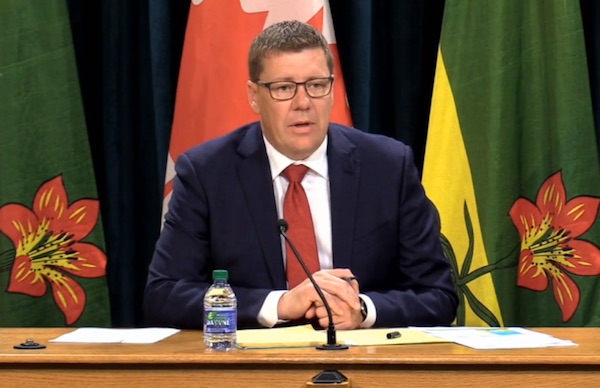Alberta
Saskatchewan Premier Scott Moe is leading the fight against our own federal government to save Canada

Article submitted by Josh Andrus of Project Confederation
A lot of media attention of late has been focused on the Emergencies Act testimonies in Ottawa and Danielle Smith’s rise to the Premier’s Office here in Alberta.
However, the biggest development in federal/provincial politics in the last week might actually have happened in Saskatchewan, where Premier Scott Moe has taken a firm stance against the federal government in a document entitled Drawing the Line: Defending Saskatchewan’s Economic Autonomy.
The paper clearly sets out a problem and then proposes specific solutions.
First, the problem…
The Saskatchewan government has identified nine different federal climate change policies that are estimated to cost the province a total of $111 billion between 2022 and 2035 – the approximate halfway point to the federal government’s 2050 net-zero targets.
The costs of each of the nine policies are:
- Federal Carbon Tax: $24.7 billion;
- Oil and Gas Methane Mandate: $6.3 billion;
- Oil and Gas Emissions Cap: $2.6 billion;
- Fertilizer Mandate: $19.3 billion;
- Clean Fuel Regulations: $34.9 billion;
- Zero Emission Vehicle Mandate: $10.3 billion;
- Federal Output Based Pricing System: $12.5 billion;
- Agriculture Methane Initiatives: $0.5 billion;
- Landfill Methane Mandate: $0.2 billion.
Don’t forget – these are just the direct costs.
We all know that the energy industry powers every other industry and, since energy is required to create almost every other product, as energy prices increase, costs for consumer goods will undoubtedly rise across the board as well.
Scott Moe and his team have a clear understanding of the problem and are deeply concerned about the impacts federal environmental policy can have on the economy.
For a province like Saskatchewan, where total provincial revenue for 2022 was just $17.2 billion, $111 billion is a gigantic cost.
And if that’s the cost to our neighbours, imagine what it will cost here in Alberta!
Remember too, this is just the first half of the federal government’s 2050 plan!
The economic costs of Net Zero 2050 are completely lost on the Trudeau government.
The 2021 Supreme Court of Canada ruling on the constitutionality of the Carbon Tax, as we noted at the time, creates a dangerous precedent where the federal government can essentially trample all over the constitutional jurisdiction of provinces using the Peace, Order, and Good Governance Clause embedded in the constitution.
This means that the Supreme Court has effectively ruled that the federal government can take control of practically any issue, simply by claiming that it is a matter of national concern – completely ignoring provincial jurisdiction.
Consider that the definition of Confederation, as espoused by the Oxford English Dictionary, is a union of sovereign groups or states united for purposes of common action.
Instead, what we now have is a federal government that has decided, upon the alter of climate change, to sacrifice our livelihoods and, with them, the very idea of Canada itself.
If we want to save this country, we need substantial reforms to the way this country is governed.
Thankfully, the Saskatchewan government’s paper also proposes some solutions that include:
- Provincial legislation to clarify and protect constitutional rights belonging to the province.
- Pursuing greater autonomy over immigration policy to ensure Saskatchewan has the people it needs.
- Better recognition of Saskatchewan industry’s contributions to sustainable growth – for example, developing a carbon credit market to support our natural resource industries.
- Preparing to take legal actions, legislative or otherwise, to maintain control of electricity, fertilizer emission/use targets and oil and gas emissions/production.
Here at Project Confederation, we’re very supportive of these ideas – in fact, many of them are ideas we’ve been promoting not just for Alberta, but for all of the west, since we launched as an organization.
So, props to Scott Moe and the Saskatchewan government for pushing us down the right path.
With your continued support, we can’t help but be excited about what we are capable of as we move forward.
Having seen significant success in Alberta already, we will be expanding our work all across Saskatchewan and the other western provinces in the coming months, as we take on Ottawa and prepare for the onslaught of a hostile federal government over the next few years.
If you’d like to get involved in our campaigns, you can sign up to volunteer with us here.
We also need financial support to continue with our work.
If you can afford to help fund our important work, please click here to make a contribution:
Thank you again to everyone for their help with this campaign and we look forward to working with you on many more issues in the future.
Regards,
Josh Andrus
Executive Director
Project Confederation
Alberta
Alberta takes big step towards shorter wait times and higher quality health care

From the Fraser Institute
On Monday, the Smith government announced that beginning next year it will change the way it funds surgeries in Alberta. This is a big step towards unlocking the ability of Alberta’s health-care system to provide more, better and faster services for the same or possibly fewer dollars.
To understand the significance of this change, you must understand the consequences of the current (and outdated) approach.
Currently, the Alberta government pays a lump sum of money to hospitals each year. Consequently, hospitals perceive patients as a drain on their budgets. From the hospital’s perspective, there’s little financial incentive to serve more patients, operate more efficiently and provide superior quality services.
Consider what would happen if your local grocery store received a giant bag of money each year to feed people. The number of items would quickly decline to whatever was most convenient for the store to provide. (Have a favourite cereal? Too bad.) Store hours would become less convenient for customers, alongside a general decline in overall service. This type of grocery store, like an Alberta hospital, is actually financially better off (that is, it saves money) if you go elsewhere.
The Smith government plans to flip this entire system on its head, to the benefit of patients and taxpayers. Instead of handing out bags of money each year to providers, the new system—known as “activity-based funding”—will pay health-care providers for each patient they treat, based on the patient’s particular condition and important factors that may add complexity or cost to their care.
This turns patients from a drain on budgets into a source of additional revenue. The result, as has been demonstrated in other universal health-care systems worldwide, is more services delivered using existing health-care infrastructure, lower wait times, improved quality of care, improved access to medical technologies, and less waste.
In other words, Albertans will receive far better value from their health-care system, which is currently among the most expensive in the world. And relief can’t come soon enough—for example, last year in Alberta the median wait time for orthopedic surgeries including hip and knee replacements was 66.8 weeks.
The naysayers argue this approach will undermine the province’s universal system and hurt patients. But by allowing a spectrum of providers to compete for the delivery of quality care, Alberta will follow the lead of other more successful universal health-care systems in countries such as Australia, Germany, the Netherlands and Switzerland and create greater accountability for hospitals and other health-care providers. Taxpayers will get a much better picture of what they’re paying for and how much they pay.
Again, Alberta is not exploring an untested policy. Almost every other developed country with universal health care uses some form of “activity-based funding” for hospital and surgical care. And remember, we already spend more on health care than our counterparts in nearly all of these countries yet endure longer wait times and poorer access to services generally, in part because of how we pay for surgical care.
While the devil is always in the details, and while it’s still possible for the Alberta government to get this wrong, Monday’s announcement is a big step in the right direction. A funding model that puts patients first will get Albertans more of the high-quality health care they already pay for in a timelier fashion. And provide to other provinces an example of bold health-care reform.
Alberta
Alberta’s embrace of activity-based funding is great news for patients

 From the Montreal Economic Institute
From the Montreal Economic Institute
Alberta’s move to fund acute care services through activity-based funding follows best practices internationally, points out an MEI researcher following an announcement made by Premier Danielle Smith earlier today.
“For too long, the way hospitals were funded in Alberta incentivized treating fewer patients, contributing to our long wait times,” explains Krystle Wittevrongel, director of research at the MEI. “International experience has shown that, with the proper funding models in place, health systems become more efficient to the benefit of patients.”
Currently, Alberta’s hospitals are financed under a system called “global budgeting.” This involves allocating a pre-set amount of funding to pay for a specific number of services based on previous years’ budgets.
Under the government’s newly proposed funding system, hospitals receive a fixed payment for each treatment delivered.
An Economic Note published by the MEI last year showed that Quebec’s gradual adoption of activity-based funding led to higher productivity and lower costs in the province’s health system.
Notably, the province observed that the per-procedure cost of MRIs fell by four per cent as the number of procedures performed increased by 22 per cent.
In the radiology and oncology sector, it observed productivity increases of 26 per cent while procedure costs decreased by seven per cent.
“Being able to perform more surgeries, at lower costs, and within shorter timelines is exactly what Alberta’s patients need, and Premier Smith understands that,” continued Mrs. Wittevrongel. “Today’s announcement is a good first step, and we look forward to seeing a successful roll-out once appropriate funding levels per procedure are set.”
The governments expects to roll-out this new funding model for select procedures starting in 2026.
* * *
The MEI is an independent public policy think tank with offices in Montreal, Ottawa, and Calgary. Through its publications, media appearances, and advisory services to policymakers, the MEI stimulates public policy debate and reforms based on sound economics and entrepreneurship.
-

 2025 Federal Election1 day ago
2025 Federal Election1 day agoResearchers Link China’s Intelligence and Elite Influence Arms to B.C. Government, Liberal Party, and Trudeau-Appointed Senator
-

 2025 Federal Election2 days ago
2025 Federal Election2 days agoRCMP memo warns of Chinese interference on Canadian university campuses to affect election
-

 COVID-191 day ago
COVID-191 day agoFauci, top COVID officials have criminal referral requests filed against them in 7 states
-

 Censorship Industrial Complex21 hours ago
Censorship Industrial Complex21 hours agoFormer residential school student refutes ‘genocide’ claims, recalls positive experience
-

 COVID-1915 hours ago
COVID-1915 hours agoCDC Vaccine Safety Director May Have Destroyed Records, Says Sen. Ron Johnson
-

 Bjorn Lomborg1 day ago
Bjorn Lomborg1 day agoThe stupidity of Net Zero | Bjorn Lomborg on how climate alarmism leads to economic crisis
-

 2025 Federal Election8 hours ago
2025 Federal Election8 hours agoWhat Trump Says About Modern U.S. And What Carney Is Hiding About Canada
-

 Business2 days ago
Business2 days agoStocks soar after Trump suspends tariffs










